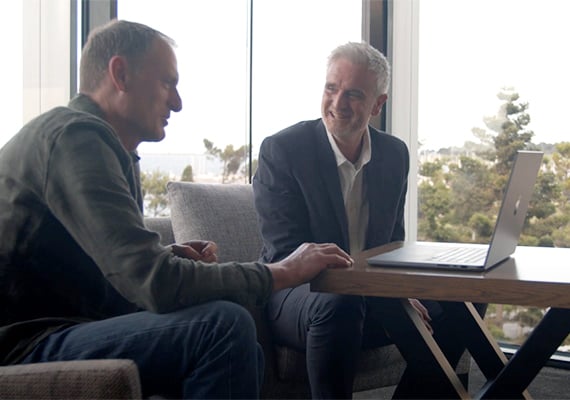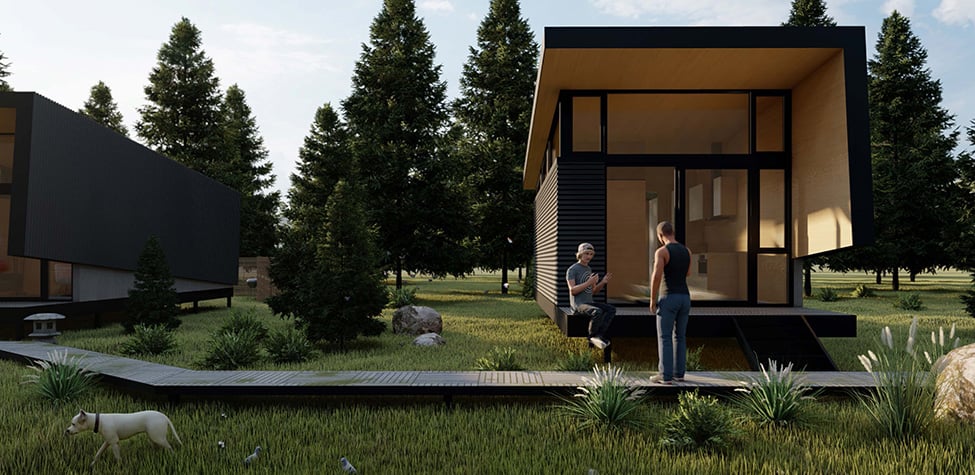Professor Richard Tucker (GCertHigherEd ‘08 Deakin) and his colleagues are playing their part to solve the growing housing crisis – one (tiny) home at a time.
With Dr Fiona Andrews, Professor Tucker is the co-leader of HOME Research Centre – a unique, interdisciplinary group of more than 30 researchers based at Deakin University. The team work to provide co-designed solutions to complex problems of access to affordable housing, homelessness and social inclusion.
Professor Tucker is an award-winning architecture scholar, with a particular interest in sustainable design. His HOME colleagues come from diverse disciplines including health, disability studies, geography, anthropology, policy, law and economics. The group was drawn together by shared values and the ever-present challenge of sourcing funding for new research.
'We realised that we had to reach out to other disciplines and work with them to try and communicate the value of our research in a wider context,' Professor Tucker explains.
The University provided seed funding for an initial workshop, where HOME’s four key themes were established. They are:
- Home for life
- Home we can afford
- Home where we know neighbours
- Home that is connected.
And through those conversations we realised that there were quite a few Deakin people working on housing, but they were all working on it from different disciplinary perspectives, and what a good idea it would be to bring all those people together.
Professor Richard Tucker
Co-leader, HOME Research Centre, Deakin University
An early HOME project that generated significant attention was the Geelong Microvillage Project. The six-stage analysis explored the viability of increasing the supply of affordable, small houses in the region.
The project was created in response to the growing public interest in tiny homes and their possible use to alleviate housing supply challenges. The report found that it was difficult to untangle the range of issues and possible solutions associated with the design, building, financing and community integration of innovative housing models. Regulation is a key issue.
'We tend to live in houses that are far too big,' Professor Tucker says. 'In fact, Australia’s got the biggest houses in the world. So the problem is with shifting those regulatory barriers that rather than becoming the minimum standard, unintentionally become the standard.'
'There are certain circumstances where it might work, so for instance, if someone wants to build a tiny home in a relative’s back garden, then that might be a very good solution.'
'If homes are well-designed, and we suggested 40 square metres being the minimum, then they can work.'
Thanks to the meaningful partnerships developed during its initial phase, the Geelong Microvillage Project scope was extended to involve Deakin architecture students in the design and prototype of a housing solution for local homeless men.

Engagement Australia 2022 Excellence Awards finalist
Professor Tucker is proud to be a finalist in the Award for Outstanding Engagement for Research Impact for the HOME Research Hub project: From Microvillage to Transitional Housing for Homeless Men.
HOME collaborated with Samaritan House and FormFlow – a Geelong manufacturer of innovative building materials, led by Deakin alumnus and donor, Matt Dingle (PhD ‘02, BEng(Man) ‘98 Deakin). Via this partnership, FormFlow advanced the use of a new, prefabricated cladding technology that provides better performance at a cheaper price. Using this system, and collaborating with builders and clients, Deakin students realised construction of one compact home prototype. The project received almost a million dollars of state and local government funding, allowing seven of these compact dwellings to be built.
HOME is continuing this research to determine if the housing model improves the transitioning process for homeless men and may be transferrable to assist other groups providing housing to people experiencing homelessness. HOME’s research projects are many and include the design of family and child-friendly apartments, devising housing solutions for people with intellectual disabilities and better understanding disaster relief housing responses.
Professor Tucker welcomes new business, not-for-profit, philanthropic and government partners to come on board and work towards a home for all. Together with the HOME team, he wants to first and foremost find out what is successful and what can be improved in housing, before spending money on unproven models. He also highlights the importance of bringing together those who cannot access well-designed affordable housing with those who might be able to help. Because it is through these partnerships that solutions are found.
Interested in finding out more?
HOME is an interdisciplinary group of 30 Deakin researchers working with communities to address the urgent need to deliver affordable, well designed, sustainable and connected housing. Our team has expertise across design, architecture, health, homelessness, disability, accessibility and more.

